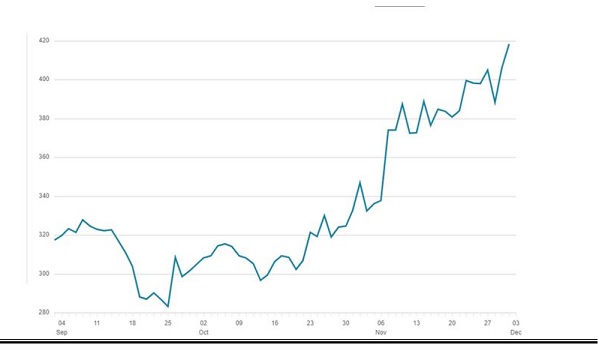
HSBC has seen its share price rocket more than 50% since it hit a 25-year low in September.
The UK's biggest bank has been under increasing regulatory and economic pressure in its key markets, including Europe and Asia.
But since September its fortunes have changed with its shares rising by more than 50% in Hong Kong and 48% in London, where it is listed.
Headquartered in London, more than half of HSBC's profits come from Asia.
Although this quarter has been a strong one for the bank's dual-listed share price, it is still down about one-third since the start of the year.
What has changed?
In October, HSBC recorded better-than-expected third quarter results on cost savings.
Despite profits being down 46%, its operations in Asia "continued to perform resiliently" with pre-tax profits of $3.2bn (£2.4bn).

Last month, HSBC surged as much as 8% on optimism that it may soon resume paying dividends.
"Now is the time for financials to shine and it seems HSBC is at the top of many lists since they have done enough to restart their dividend," says Edward Moya at trading firm Oanda.
Investors have also been more positive on financial stocks in general with hopes that a Covid-19 vaccine will boost the global economy.
"The top banks will all benefit from a strong global economic recovery that will boost jobs, credit card spending, and drive business lending," Mr Moya added.
HSBC's fortunes have further improved on expectations that President-elect Joe Biden will take a softer stance on China following rising tensions and a US trade war that began in 2018.
Incumbent Donald Trump has been keeping the pressure on China, and on Wednesday the Senate passed a bill that places restrictions on Chinese firms listing in the US.

